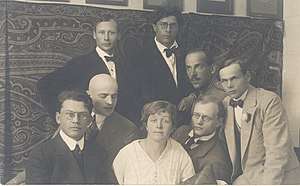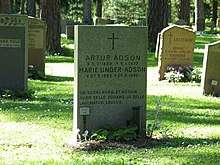Artur Adson
Artur Adson (3 February [O.S. 22 January] 1889 – 5 January 1977) was an Estonian poet, writer and theatre critic.[1]
Artur Adson | |
|---|---|
 Artur Adson (seated second from left) with fellow members of the Siuru movement in 1917 | |
| Born | 3 February [O.S. 22 January] 1889 Sänna, Estonia |
| Died | 5 January 1977 (aged 86) Stockholm, Sweden |
| Nationality | Estonian |
| Literary movement | Siuru, Tarapita |
| Spouse | Marie Under |
Early years
Artur Adson (born Karl Arthur Adson) was born in Tartu and attended school in Tartu, Sänna and Võru. After graduating he first studied surveying in Pskov. In 1925-26, he studied literature at the University of Tartu. Artur Adson was a surveyor, journalist and theater critic in Estonia and Russia. He met his future wife Marie Under in 1913 and were married in 1927.
Literary career
From 1917 Artur Adson was a member of the Siuru literary movement, which exerted great influence on the Estonian literature. Later Adson was also active in the Tarapita movement. In addition, Adson was one of the most outstanding poets in the Võro language of southern Estonia. As an often conservative theatrical and literary critic, he exercised influence on the cultural scene of the Republic of Estonia.
Exile

With the Soviet occupation of Estonia Artur Adson and his wife fled into exile to Sweden. There, he found employment as an archivist. Both continued their interest in the Estonian literature. Adson died in Stockholm, aged 87. Both Adson and Under are interred at the Skogskyrkogården cemetery in Stockholm.
Poetry
- "Henge palango" (1917)
- "Vana LATERNA" (1919)
- "Roosikrants" (1920)
- "Kaduvik" (1927)
- "Katai, kibuvits Nink Kivi" (1928)
- "Pärlijõgi" (1931)
- "Lehekülg ajaraamatust" (1937)
- "Rahumäe kannel" (1973)
Plays
- Läheb mööda (1923)
- Toomapäev (1928)
- Neli Kuningat (1931)
- Lauluisa yes Kirjaneitsi (1930
- Iluduskuninganna (1932)
References
- Don Rubin, Peter Nagy, Philippe Rouyer, World Encyclopedia of Contemporary Theatre: Europe, Taylor & Francis, 1995, ISBN 0-415-05928-3, p248